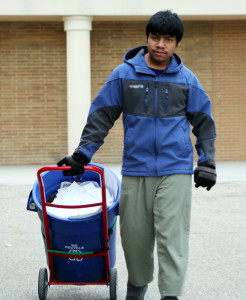
A Boise School District program supports nearly 50 students with disabilities past their high school years and until they turn 21. The Student Transition Education Program (STEP) gives students the opportunity to become independent, obtain paid employment and live on their own or in supported living environments.
For Chandra Sarki, it’s a chance to find something he’s interested in.
“I just love my class,” Sarki said. “Recycling is my favorite job to do.”
STEP provides a setting and instruction in five transition areas:
- Vocational/employment
- Self-management/home living
- Personal/Social
- Leisure/recreation
- General community functioning
“The more independent the students are, the more they realize they can accomplish a task,” said Russell Byrne, a STEP teacher at Borah High School.

Byrne creates a fast moving environment for his students. Each activity for the day is less than 60 minutes.
- Morning exercise (stretching and walking around campus)
- Complete daily task (collect recyclables around Borah High School or assist with assembling picnic tables for local business)
- Volunteer at a job site (Idaho Pizza Company or Overland Park Cinemas)
- Classroom time (review top news stories of the day and hygiene)
Every day a bus picks up Byrne’s class and takes the students to Overland Park Cinemas or Idaho Pizza Company. The students clean the theaters or fold pizza boxes. The class also takes trips to Walmart for social and shopping skills.
“We have our students work in a community setting because it’s good for them,” Byrne said. “When the students have different jobs to complete it gives them great responsibility.”
Sandra Elliott, a special education paraprofessional at Borah, has been working with STEP students for more than 20 years.
“Some people are afraid of the students and stay away because they don’t understand the disabilities,” Elliott said. “They have a lot to offer.”
